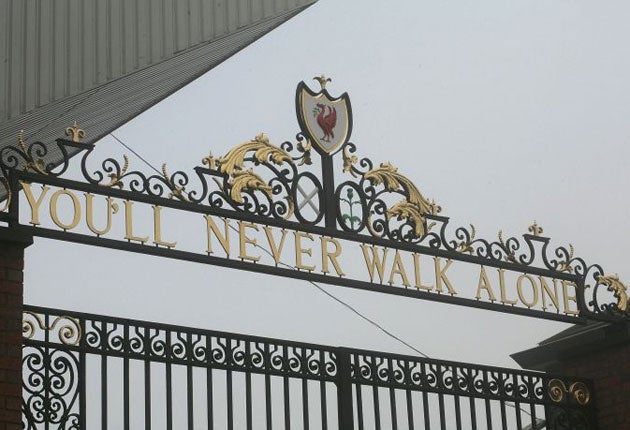Q & A on Liverpool takeover

Your support helps us to tell the story
From reproductive rights to climate change to Big Tech, The Independent is on the ground when the story is developing. Whether it's investigating the financials of Elon Musk's pro-Trump PAC or producing our latest documentary, 'The A Word', which shines a light on the American women fighting for reproductive rights, we know how important it is to parse out the facts from the messaging.
At such a critical moment in US history, we need reporters on the ground. Your donation allows us to keep sending journalists to speak to both sides of the story.
The Independent is trusted by Americans across the entire political spectrum. And unlike many other quality news outlets, we choose not to lock Americans out of our reporting and analysis with paywalls. We believe quality journalism should be available to everyone, paid for by those who can afford it.
Your support makes all the difference.Liverpool's board of directors have agreed the sale of the club to New England Sports Ventures, subject to Premier League approval and the resolution of a board dispute. Here, we answer some questions surrounding the latest developments.
Q. Why is there a crisis at Liverpool?
A. The board, led by independent chairman Martin Broughton, have accepted an offer of around £300million for the club from New England Sports Ventures, owners of the Boston Red Sox baseball team. Liverpool's owners Tom Hicks and George Gillett are fiercely opposed to accepting the offer.
Q. What has Hicks and Gillett's response been?
A. They have taken legal action to try to overturn the board's decision. They have also attempted to sack two members of the board, managing director Christian Purslow and commercial director Ian Ayre, and replace them with their own appointments.
Q. Why are Hicks and Gillett so against the offer?
A. They believe the price of £300million grossly under-values the club - and because they would each take a massive financial hit.
Q. But £300million seems like a lot of money - isn't that far more than they paid for the club in 2007?
A. Yes, they paid £219million, funded entirely by bank loans, but since then the debt has swelled due to interest and other fees to £280million, and they have invested £144.4million into Kop Holdings via a company registered in the Cayman Islands, which was then lent to Liverpool.
Q. What would Hicks and Gillett be left with if the £300million buy-out goes ahead?
A. Around £200million would go towards paying off the Royal Bank of Scotland and Wachovia debts. RBS would be likely to leave around £30million of the debt as a credit facility for the new owners. Only after all the other creditors are paid would any left-over cash go to Hicks and Gillett towards the £144.4million loan they put in.
Q. What about the penalty fees that Hicks and Gillett have built up with RBS?
A. They total around £45million but they would no doubt be subject to legal challenges too.
Q. So what size of loss are Hicks and Gillett contemplating?
A. A sizeable one, even as much as £100million.
Q. What is the next step?
A. The lawyers have moved in with Hicks and Gillett trying to block the board's right to agree a takeover. If they sack the board, then RBS would claim that would put the Americans in breach of their refinancing agreement signed in April.
Q. What if they succeed?
A. Hicks and Gillett are caught between a rock and a hard place. Even if they succeed then unless they have raised funds to pay off their debts by October 15 then RBS will assume control of the club, put Kop Holdings into administration and sell Liverpool themselves - mostly likely to New England Sports Ventures.
Q. What message does this send about the ownership of football clubs?
A. Taking on 100% bank loans to finance a club takeover is asking for trouble.
Q. Will this have any effect on the Glazer family's ownership of Manchester United?
A. Not directly - United are far stronger commercially and have the money-making machine of Old Trafford. But woe betide the Glazers should United's success on the field start to falter.
Join our commenting forum
Join thought-provoking conversations, follow other Independent readers and see their replies
Comments